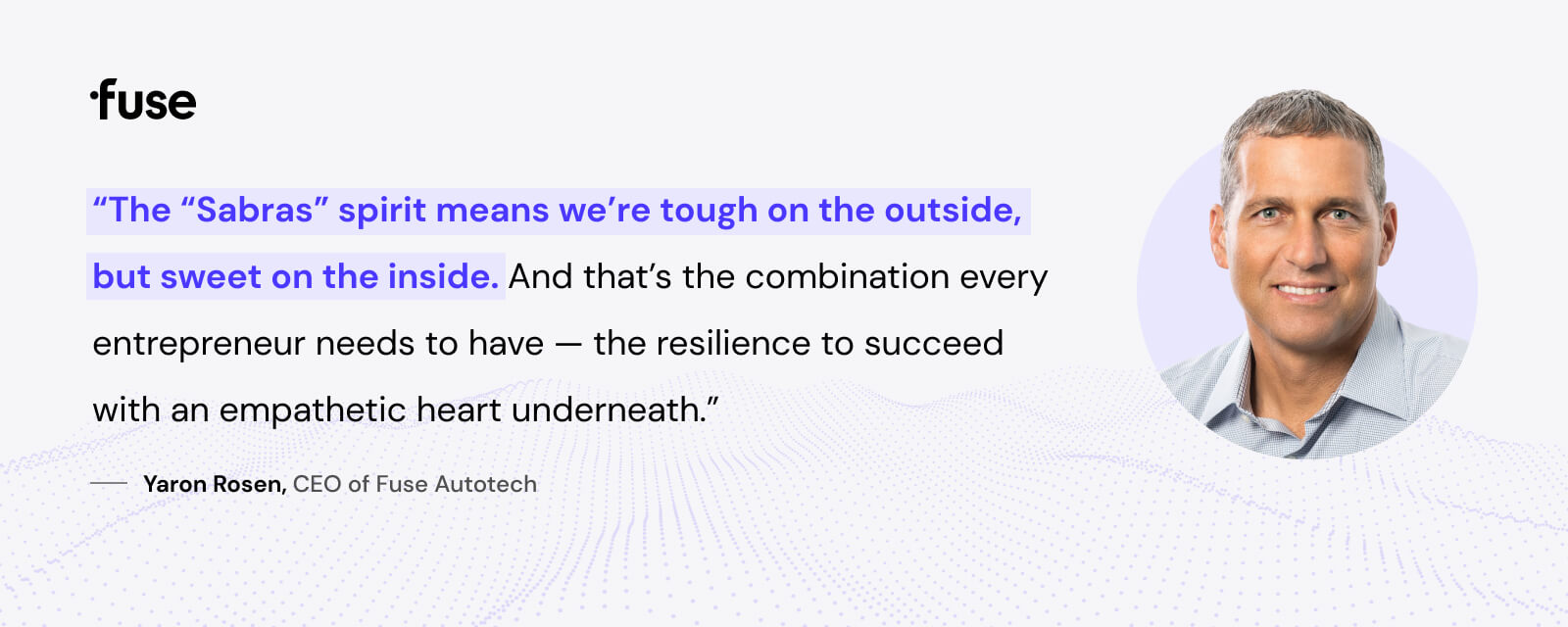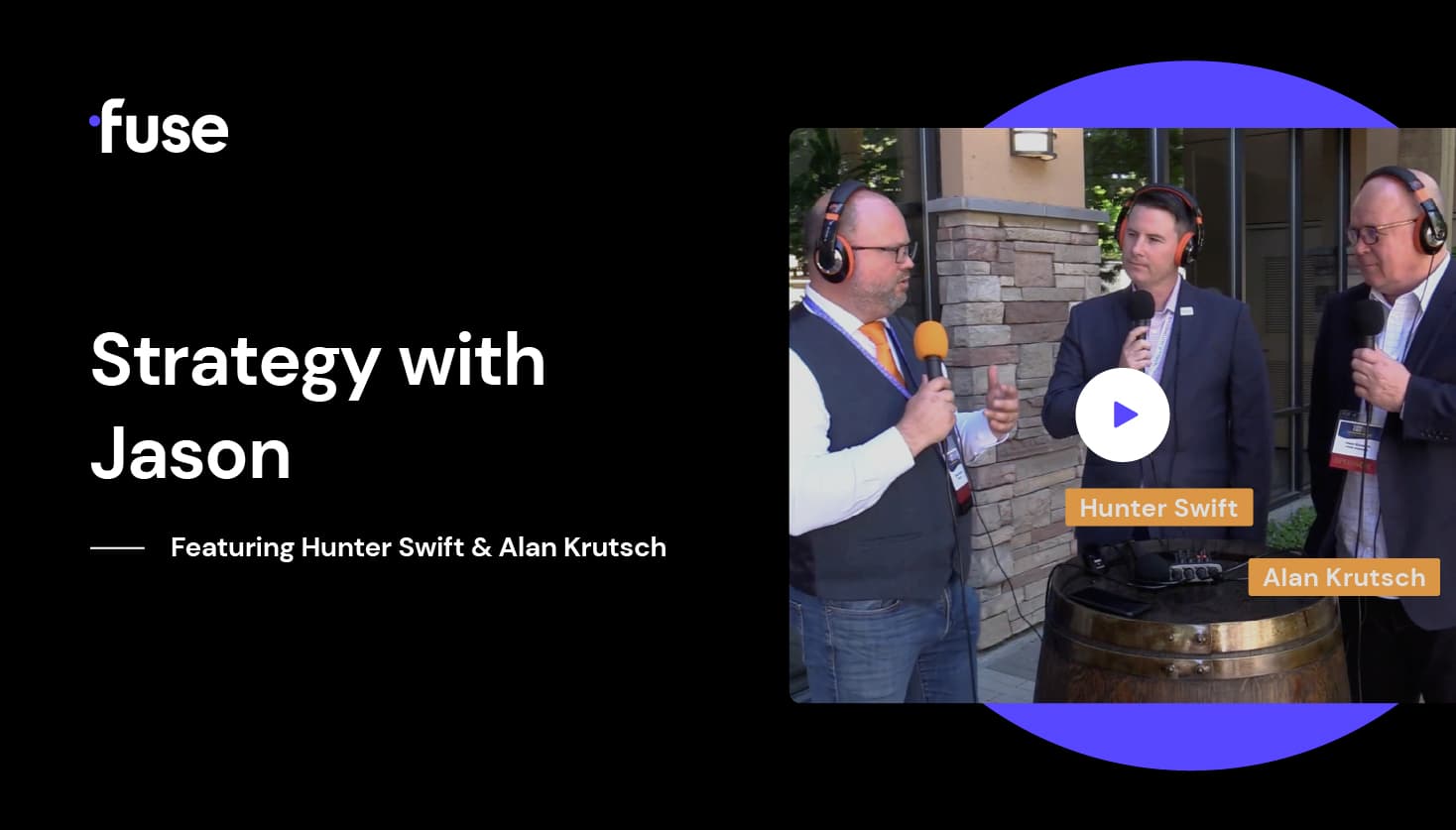Thursday, September 23rd at 11:00 AM ET
Nulla ut nisl a tellus pretium efficitur
News and Insights
• September 15, 2023

By: Fuse
11 minute read
Interesting lives are undeniable — and Yaron Rosen has led a fascinating life.
As CEO of Fuse, Yaron brings a wealth of personal and professional experience to the cutting edge of autotech.
He has lived in Japan, Israel, and the United States, served in the Israeli military for 32 years, and as General, became the Air Division Joint Operations Commander, and in his last position, Chief of the Israel Defense Forces Cyber Staff.
As an entrepreneur, he has partnered with global leaders, worked alongside leading governments, and launched cyberspace startups for both NATO and the private sector.
In his home life, Yaron is happily married, has four children (each raised on military bases), and completes a three-hour workout each morning. Oh, and he surfs and sails all around the world.
Now at the helm of Fuse, Yaron describes himself as “the happiest man in the world.” It’s not just because the team is “incredible,” as he puts it, but because Fuse is a place where he can “see real change happen in real time."
In our summer sit down with Yaron, we heard a fascinating story that has as much to say about startups as it does about mindset, process, and the “Sabra” spirit of Israel.
Without further adieu, here’s an up-close look at the life and career of Yaron Rosen.
Yaron, thanks for taking the time.
My pleasure.
Well, I have my parents to thank for broadening my horizons so early in life.
I was born in Israel, but I spent much of my youth in Japan. In Tokyo I studied at ASIJ - The American School in Japan, and at 18, I joined the Israeli Air Force (IDF) and became a pilot.
In the next 32 years of service, I would meet my wife, have four kids, and raise each of them on Air Force bases.
Looking back, I’d say that my time in the IDF really hastened my maturity. I took on enormous responsibility early in life, and it taught me the values of independence, responsibility, and accountability.
Over the years, I’ve found that autonomy and self-motivation transcend borders and cultures. It has served me everywhere I go.
In fact, I really believe those early lessons prepared me to become an entrepreneur, because they equipped me with the mindset needed to succeed.

I was Joint Operations Division Commander until 2015 and Chief of Israel Defense Forces (IDF) Cyber Staff until 2018.
However, I’m proud to say that reserve duty remains a central part of my life since retirement. At least once a week, I serve as an instructor pilot and a Cell Commander in the IDF Operations Center.
It’s part of my journey — and part of my commitment to my country.
That’s an interesting question, because I’ve always viewed the Air Force as a type of startup.
Israel as a country — it’s a startup nation, in a way.
Well, with the Air Force, you have a very specific, well-known brand. It’s a sharp place where you fail fast and learn faster.
It’s also very open and non-hierarchical.
For example, let’s say you’re a general and you fly with a first lieutenant. You land the plane, and as soon as you hit the tarmac, the lieutenant cuts into you — even though you outrank him. He tells you where you failed and where you need to improve.
In the Air Force, rank is immaterial when you’re in the cockpit — and when you’re debriefed.
All that matters is this: did you hit your target? Yes or no?
No one is beyond criticism, and everyone has something to learn.
The Air Force has a cross-functional team DNA, and I’ve aimed to replicate that in the private sector.
They absolutely do — and that’s what I’ve tried to change.
I’ve worked with many innovators and entrepreneurs, and I’ve sat on many boards, and guess what? As you say, they all love hierarchy and org charts.
So the first thing I try to do is flatten them, because in my opinion, you lose something with every new level you’re adding.
Of course, accountability and responsibility are essential qualities, but hierarchy tends to silo groups of people. It creates division and discord, little cliques with their own DNA.
Then, when things fall apart, accountability gives way to accusation: “I didn’t do it. They did it.”
In my experience, hierarchy tends to undermine cohesion and communication.
Well, I at least try not to scare people too fast. But this philosophy — the “Air Force as startup” philosophy — it’s in my veins.
Listen, a startup is a very special place, and the things we practice on day one may ultimately define us on day 1,000.
Let’s say we built a company with just 10 people.
It’s an intimate office at first, but that little family is going to quickly turn into a tribe; that tribe is going to become a village; that village will become a small town, and before long, that small town will be a major metropolitan area.
If the foundation is strong, everything else tends to slot into place.
Not at all.
I had dreamed of being an entrepreneur for decades, so my eagerness to start easily eclipsed any anxiety I might have had at the time.
It also helped that I had served as Chief of IDF Cyber Staff, which provided my first introduction to cyberspace.
That became the launchpad for my entrepreneurial career.
About six years ago, I founded my first startup, Toka, where I served as CEO for several years.
From there, I built the sales operation that partnered with law enforcement and government agencies. Toka was invested by frontline Venture Capital like Andreessen Horowitz, Entree Capital, Dell Technologies Capital, MSD, Eclipse Ventures, and Upfront Ventures.
Correct.
A few months ago, I started thinking about what’s next. “Do I want to go back into the trenches as a CEO, or do I want to go the venture capital route?”
It wasn’t a tough decision at all. I wanted the trenches, because I love working with people, I love products, and I love leading. That’s what I’ve done most of my adult life.
So, I started looking around, and I actually bumped into Elie Wurtman from PICO Venture Partners, who told me about Fuse.
I was in Mexico at the time, and I got in touch with Andrew Walser, Co-Executive Chairman of Fuse and CEO of Walser Automotive Group, and said, “Hey, we’re almost on the same longitude. Why don’t I fly up to Minneapolis and we can chat?”
Pretty much. I flew up a week later, stepped into a dealership, and fell in love with the people and how an F&I automation product would transform the car buying experience. Besides that, the tech-stack was absolutely crazy, which made it even more interesting.
The moment I met the team in Minneapolis, I knew Fuse is where I belonged. And about six weeks later, I was the CEO.
I’m just a few months into the journey, but I can honestly say that I’m the happiest man on earth.
I love this place.
>> Related Read - How Empathy Fuels Fuse: A Q&A with Caitlin Earnhart, Senior Manager - Customer Success
Yes, that’s true.
I met Ehud Barak when I was in the Air Force, when he was the Minister of Defense.
It’s funny, I actually ran into him when I was in my last position as the Chief of IDF Cyber Staff.
I wanted his perspective and support, because I was attempting to undertake a total transformation of the whole way the IDF was organized to deal with cyberspace challenges.
Now, I was talking to him as an entrepreneur in need of financing. He knew that, and I didn’t try to hide it. So, my partners and I carefully explained what Toka was all about, and we talked for hours.
It was a great conversation — Ehud honestly knows everything about everything — but at the end of it all, he said, “I don’t want to give you any money.”
Exactly. We were stunned!
Then, he said, “I want to be your partner.”
This was complicated news, because Ehud had a reputation as a very difficult person to work with. I’m not gossiping here, that’s publicly-known information.
So I tried to be honest and told him, “Look, if you want to partner with us, we have to get to know each other better. A business partnership is like a marriage.”
He agreed, and we started working together.
Fast forward a bit, and we all found Ehud to be the absolute kindest person as a partner. He was fantastic — so disciplined, humorous, and he loved to talk.
I used to have to kick him under the table to get him to let other people talk.
I loved working with him.
Well, it was a very unique company. Nothing like it existed at the time, so it was very compelling to him.
Basically, Toka works with NATO allies — like North America, Europe, Australia, New Zealand, Singapore, and Israel.
The company provides intelligence gathering and operational capabilities to police, military, and intelligence agencies around the world.
I always wanted to work with the private sector, so I founded Illuminant — a hybrid of a managed security service provider (MSSP) and an integrator of cyber defense capabilities.
In short, Illuminant was built to provide digital peace of mind for critical infrastructure and manufacturing.
We’re protecting people and companies from cyber criminals, of which there are many, I’m sorry to say.
Yes, but we’ll save them for another day.
Once again, I faced a similar dilemma: to enter the venture capital world or return to the trenches.
Again, I’ll make a long story short: when I met the team in Minneapolis, I knew Fuse was my future.
I love to simplify complicated processes.
I learned to do that in the military, where we undertook transformations on a national level — sometimes with thousands of people involved.
It’s difficult to describe, but I truly enjoy that transformational process. And when I say “transform,” I’m not just talking about technology alone, but the people and personalities that accompany it.
That’s the triumvirate that I always look for: people, process, and technology.
And that’s one of the reasons I fell in love with Fuse, because I understood the cultural transformation that Fuse can provide to dealerships.
I saw how much value Fuse can bring to the car-buying experience, and I recognized how much dealerships want to evolve into a healthier, more dynamic culture.
The best part is, these are changes and transformations that I can see with my own eyes. And I really appreciate that, because coming from the world of cybersecurity, tangible results were slightly harder to perceive.
At Fuse, we see real change happen in real time. It’s immensely rewarding.
The people are incredible.
And I’m not exaggerating when I say that, because I actually joined the team without meeting a single employee — besides the board members in Minneapolis and Israel, of course.
While I was definitely expecting people to be friendly, they have exceeded my expectations in every way.
The Fuse family is kind, motivated, selfless — basically, a dream team for any CEO.
>> Related Read - Working at Fuse: Q&A with Head of Engineering Johnny Mor
Yeah, there’s basically Silicon Valley and Tel Aviv, right?
I think the Israeli ecosystem is built for entrepreneurship to flourish. It has the people, process, and technology all in one place.
More than anything, Tel Aviv also has the mentality and the necessity for success.
If “necessity is the mother of invention,” then Israelis have what I call “a mentality of necessity.” They work hard, and thanks to the military, they grow up fast.
They don’t take anything for granted.
At age 18, they assume the hardest jobs and missions in the world. After they finish their service, they enter the private sector with incredible confidence, maturity, and diligence.
That’s why we’re called “Sabras,” after the desert plant. We’re tough on the outside, but sweet on the inside. And that’s the combination every entrepreneur needs to have — the resilience to succeed with an empathetic heart underneath.
In my opinion, that’s why Israel is dominating the tech scene. They have the technology, the people, the processes and an unbeatable mentality.
It’s the perfect ecosystem for innovation.
>> Want to Learn More About Fuse’s Technology? Request a Demo Today.

“If you had a superpower, what would it be?” While others might say “flying,” Caitlin Earnhart takes a more grounded approach. As Senior Manager - Customer Success for Fuse Autotech, Caitlin believes...
News and Insights
10 min read

A funny thing happened at the Digital Marketing Strategies Conference: we saw orange. We saw Jason Harris, host of the “All Things Orange” show — ahem, the “Strategy with Jason” podcast. Jason’s...
Videos
24 min read